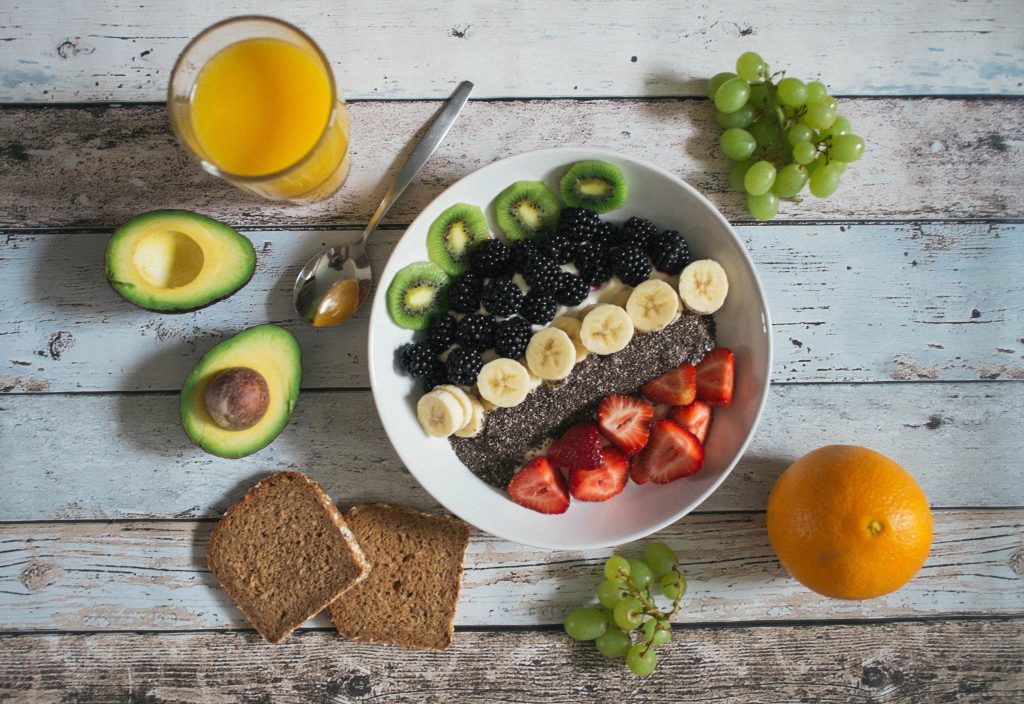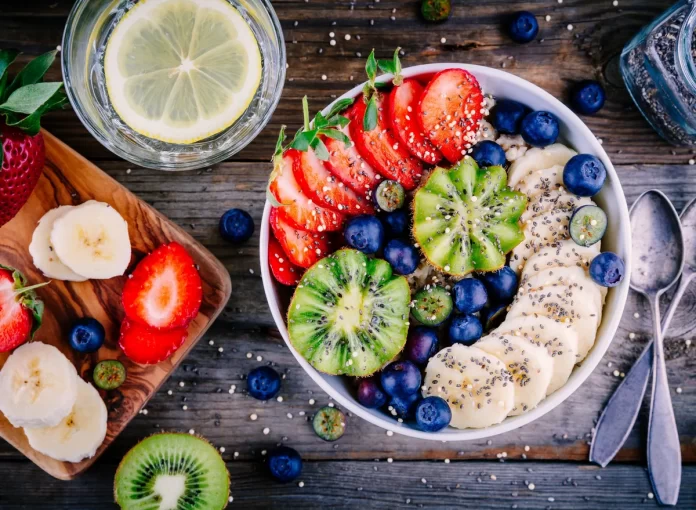The human body’s immune system acts as a formidable defense against illness and disease. However, to function optimally, it requires a constant supply of essential nutrients. By incorporating nutrient-rich foods into your diet, you can fortify your body’s natural defenses and thrive in the face of health challenges. In this comprehensive guide, we’ll explore the immune-boosting powerhouses that should be on your plate, along with practical tips for incorporating them into your daily routine.
The Mighty Vitamin C: A Staple for Immune Support
Vitamin C is a potent antioxidant that plays a crucial role in supporting the immune system. It aids in the production of white blood cells, which are the body’s first line of defense against pathogens. Fortunately, nature provides an abundant selection of vitamin C-rich foods, including:
- Citrus fruits (oranges, grapefruits, lemons, limes)
- Bell peppers (particularly red and yellow varieties)
- Kiwifruit
- Broccoli
- Strawberries
To maximize the absorption of vitamin C, try pairing these foods with sources of iron, such as lean meats, spinach, or fortified cereals.
Read Also: Unlock Optimal Gut Health: A Comprehensive Guide to Improving Digestion
Zinc: A Mighty Mineral for Immune Function
Zinc is an essential mineral that supports the development and function of immune cells, including T-cells and natural killer cells. Incorporating zinc-rich foods into your diet can help bolster your body’s defenses against infections and illnesses. Some excellent sources of zinc include:
- Oysters
- Beef
- Pumpkin seeds
- Cashews
- Chickpeas
- Yogurt
To enhance the absorption of zinc, pair these foods with vitamin C-rich sources, as vitamin C aids in the uptake of zinc by the body.
Read Also: Embracing Regular Exercise: The Pivotal Key to Conquering Stress
Antioxidant-Rich Berries: Nature’s Immune Boosters
Berries are not only delicious but also packed with powerful antioxidants that can help protect your immune cells from oxidative stress. Blueberries, raspberries, strawberries, and blackberries are excellent choices. These tiny fruits are loaded with vitamin C, vitamin E, and anthocyanins – potent antioxidants that may enhance immune function.
Incorporating berries into your diet is easy – toss them into your morning smoothie, enjoy them as a snack, or use them to top your yogurt or oatmeal. For an extra nutrient boost, try combining berries with nutrient-dense greens like spinach or kale.
Read Also: Unleashing the Power of Emotional Regulation: Top Activities for Children
Garlic: A Flavorful Ally for Immune Defense
Garlic is not only a culinary delight but also a potent immune booster. It contains allicin, a sulfur compound with antibacterial, antiviral, and antifungal properties. Garlic can help stimulate the production of white blood cells, enhancing your body’s ability to fight off infections.
To reap the benefits of garlic, consider incorporating it into your cooking whenever possible. Sautéed garlic can add depth of flavor to vegetables, soups, and sauces. You can also try crushing a few cloves and mixing them with olive oil and lemon juice for a zesty salad dressing.
Comparison Table: Nutrient-Rich Foods for Immune Support
| Food | Key Nutrients | Benefits |
|---|---|---|
| Citrus Fruits | Vitamin C | Supports white blood cell production, antioxidant properties |
| Oysters | Zinc | Aids in the development and function of immune cells |
| Berries | Vitamin C, Vitamin E, Anthocyanins | Powerful antioxidants, may enhance immune function |
| Garlic | Allicin | Antibacterial, antiviral, antifungal properties |
| Spinach | Vitamin C, Vitamin E, Beta-carotene | Antioxidants, supports immune cell function |
| Yogurt | Probiotics, Zinc | Promotes gut health, supports immune cell development |
| Salmon | Omega-3 Fatty Acids, Vitamin D | Anti-inflammatory, regulates immune response |
| Green Tea | Polyphenols (EGCG) | Antioxidant, may enhance immune cell function |
By incorporating a variety of these nutrient-rich foods into your diet, you can provide your immune system with the essential nutrients it needs to function optimally.
Read Also: Healthy Meal Prep Ideas for Weight Loss on a Budget: Nourish Your Body Without Breaking the Bank
Gut Health: The Foundation of a Strong Immune System
Did you know that a staggering 70% of your immune system is located in your gut? This is why maintaining a healthy gut is crucial for overall immune function. Incorporating probiotic-rich foods like yogurt, kefir, and fermented vegetables can help promote a balanced gut microbiome, which in turn supports a robust immune response.

Additionally, consuming prebiotic fiber from foods like onions, garlic, bananas, and whole grains can feed the beneficial bacteria in your gut, further enhancing immune function.
Read Also: Natural Remedies for Seasonal Allergies: A Comprehensive Guide
Hydration: The Unsung Hero of Immune Health
Proper hydration is essential for maintaining optimal immune function. Water plays a vital role in transporting nutrients and oxygen to your cells, including those that make up your immune system. Aim to drink at least eight glasses of water per day, and more if you exercise regularly or live in a hot or dry climate.
To make hydration more enjoyable, try infusing your water with slices of citrus fruits, berries, or herbs like mint or basil. You can also incorporate hydrating foods like cucumbers, watermelon, and tomatoes into your diet.
Read Also: The Restorative Power of Sleep: Unlocking the Benefits of Getting Enough Sleep for Overall Health
Stress Management: A Key Player in Immune Support
Chronic stress can have a detrimental impact on your immune system, leaving you more susceptible to illness and infections. To counteract this, it’s essential to incorporate stress-reducing practices into your daily routine. Some effective strategies include:
- Regular exercise
- Mindfulness and meditation
- Yoga or deep breathing exercises
- Spending time in nature
- Engaging in hobbies or activities you enjoy
By managing stress levels, you can help maintain a balanced immune response and reduce the negative impact of chronic stress on your overall health.
Consistency is Key: Building Lasting Habits
Boosting your immune system is not a one-time effort; it’s a journey that requires consistent effort and commitment. Building lasting habits around nutrient-rich foods and healthy lifestyle practices is crucial for sustained immune support. Here are some tips to help you stay on track:
- Plan your meals: Meal planning and prepping can make it easier to incorporate immune-boosting foods into your diet regularly. Set aside time each week to plan your meals and prepare ingredients in advance.
- Make it enjoyable: Experiment with different recipes and flavors to keep your meals interesting and satisfying. Don’t view a nutrient-rich diet as a chore; embrace it as an opportunity to explore new culinary adventures.
- Involve others: Engaging your family or friends in your healthy lifestyle journey can provide support, accountability, and motivation. Cook together, share recipes, and encourage each other to make positive choices.
- Be patient and persistent: Building new habits takes time and persistence. Don’t get discouraged if you slip up occasionally. Simply recommit to your goals and keep moving forward.
Remember, supporting your immune system is an ongoing process, and consistency is key to reaping the long-term benefits of a nutrient-rich diet and healthy lifestyle.
Read Also: Unleashing the Power of Emotional Regulation: Top Activities for Children
Embrace Variety for Optimal Nutrient Intake
While focusing on specific immune-boosting foods is essential, it’s also crucial to embrace variety in your diet. Different foods offer different sets of nutrients, and consuming a wide range of fruits, vegetables, whole grains, lean proteins, and healthy fats can help ensure you’re getting all the essential vitamins, minerals, and antioxidants your immune system needs.
Additionally, varying your food choices can help prevent nutrient deficiencies and keep your taste buds satisfied, making it easier to stick to a nutrient-rich diet in the long run.
Supplement Wisely: When Diet Alone Isn’t Enough
While a nutrient-rich diet should be the foundation of immune support, there may be instances where supplementation can provide an additional boost. However, it’s essential to consult with a healthcare professional before starting any new supplement regimen, as some supplements can interact with medications or have adverse effects in certain individuals.
If your healthcare provider recommends supplementation, look for high-quality, reputable brands and follow dosage guidelines carefully. Some supplements that may support immune function include:
- Vitamin C
- Zinc
- Vitamin D
- Elderberry
- Echinacea
Remember, supplements should never replace a balanced, nutrient-rich diet but rather complement it when necessary.
Link: Healthline – Top 15 Immunity-Boosting Foods
As you embark on your journey to boost your immune system through nutrient-rich foods, remember that consistency, variety, and a holistic approach are key. By nourishing your body with the right nutrients and adopting a healthy lifestyle, you can unlock the full potential of your immune defenses and thrive in the face of any challenge that comes your way.


